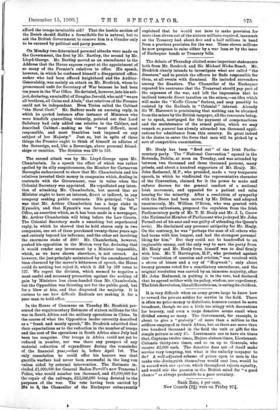Mr. Healy has been "fired out" of the Irish Parlia-
mentary party. The " National Convention " opened in the Rotunda, Dublin, at noon on Tuesday, and was attended by between two thousand and three thousand persons, many priests, and about a hundred supporters of Mr. Healy. Mr. John Redmond, M.P., who presided, made a very temperate speech, in which he vindicated the representative character of the Convention, claimed for it the power to make and enforce decrees for the general conduct of a national Irish movement, and appealed for a patient and calm hearing for the minority. After a resolution of sympathy with the Boers had been moved by Mr. Dillon and adopted unanimously, Mr. William O'Brien, who was greeted with immense enthusiasm, proposed the expulsion from the Irish Parliamentary party of Mr. T. M. Healy and Mr. J. L. Carew (the Nationalist Member of Parliament who jockeyed Mr. John Parnell out of his seat and was guilty of attending the Queen's levee). He disclaimed any personal antipathy for Mr. Healy. On the contrary, he was "perhaps the man of all others who had borne with him longest, and had the strongest personal liking for him." But they could not be handcuffed to an implacable enemy, and the only way to save the party from Mr. Healy and Mr. Healy from himself was to deal firmly with him. Mr. T. Harrington, 1LP., who protested against this "resolution of coercion and eviction," was received with a storm of hisses and a cry of " Hogwash" ; only about twenty persons voted for a conciliatory amendment, and the original resolution was carried by an immense majority, after Mr. John Redmond, in putting it to the vote, had declared that he agreed neither with its policy, wisdom, nor expediency. The Irish Revolution, like all Revolutions, is eating its children.














































 Previous page
Previous page